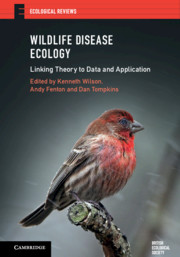Book contents
- Wildlife Disease Ecology
- Ecological Reviews
- Wildlife Disease Ecology
- Copyright page
- Contents
- Contributors
- Preface: Wildlife Disease Ecology
- Glossary of Terms
- Part I Understanding within-host processes
- Chapter one Pollinator diseases: the Bombus–Crithidia system
- Chapter Two Genetic diversity and disease spread: epidemiological models and empirical studies of a snail–trematode system
- Chapter Three Wild rodents as a natural model to study within-host parasite interactions
- Chapter Four From population to individual host scale and back again: testing theories of infection and defence in the Soay sheep of St Kilda
- Chapter Five The causes and consequences of parasite interactions: African buffalo as a case study
- Chapter Six Effects of host lifespan on the evolution of age-specific resistance: a case study of anther-smut disease on wild carnations
- Chapter Seven Sexually transmitted infections in natural populations: what have we learnt from beetles and beyond?
- Part II Understanding between-host processes
- Part III Understanding wildlife disease ecology at the community and landscape level
- Index
- Plate Section (PDF Only)
- References
Chapter Two - Genetic diversity and disease spread: epidemiological models and empirical studies of a snail–trematode system
from Part I - Understanding within-host processes
Published online by Cambridge University Press: 28 October 2019
- Wildlife Disease Ecology
- Ecological Reviews
- Wildlife Disease Ecology
- Copyright page
- Contents
- Contributors
- Preface: Wildlife Disease Ecology
- Glossary of Terms
- Part I Understanding within-host processes
- Chapter one Pollinator diseases: the Bombus–Crithidia system
- Chapter Two Genetic diversity and disease spread: epidemiological models and empirical studies of a snail–trematode system
- Chapter Three Wild rodents as a natural model to study within-host parasite interactions
- Chapter Four From population to individual host scale and back again: testing theories of infection and defence in the Soay sheep of St Kilda
- Chapter Five The causes and consequences of parasite interactions: African buffalo as a case study
- Chapter Six Effects of host lifespan on the evolution of age-specific resistance: a case study of anther-smut disease on wild carnations
- Chapter Seven Sexually transmitted infections in natural populations: what have we learnt from beetles and beyond?
- Part II Understanding between-host processes
- Part III Understanding wildlife disease ecology at the community and landscape level
- Index
- Plate Section (PDF Only)
- References
Summary
For simplicity’s sake, standard population genetic models of host–parasite coevolution often exclude ecological and epidemiological detail. In particular, they assume that each host is exposed to a single infectious propagule, regardless of the parasite’s prevalence. On the other hand, standard epidemiological models usually assume that all hosts are equally susceptible to infection. Here, we summarise models in which we relax these simplifying assumptions, thereby allowing for feedbacks between evolution, ecology, and epidemiology. One major result from these models is that, under certain general conditions, a parasite’s potential for disease spread (R0) decreases as genetic diversity for resistance increases in the host population. Moreover, R0 can increase if we allow the parasite population to track common host genotypes. Feedbacks between ecology and evolution mean that as a common genotype comes to dominate the host population, the parasite population adapts to preferentially infect this genotype, increasing the prevalence of infection and the mean number of parasite exposures per host. We further connect these findings to the major evolutionary hypothesis that coevolving parasites can favour sexual reproduction.
Keywords
- Type
- Chapter
- Information
- Wildlife Disease EcologyLinking Theory to Data and Application, pp. 32 - 57Publisher: Cambridge University PressPrint publication year: 2019
References
References
References
- 1
- Cited by

